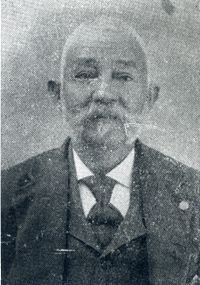Difference between revisions of "John Sunday"
m (→Death and legacy) |
(→Military service) |
||
| Line 27: | Line 27: | ||
Sunday participated in the [[Wikipedia:Siege of Port Hudson|Siege of Port Hudson]] and the [[Wikipedia:Battle of Olustee|Battle of Olustee]], among other engagements. | Sunday participated in the [[Wikipedia:Siege of Port Hudson|Siege of Port Hudson]] and the [[Wikipedia:Battle of Olustee|Battle of Olustee]], among other engagements. | ||
| + | |||
| + | Later in life, Sunday helped organize the local chapter of the [[Wikipedia:Grand Army of the Republic|Grand Army of the Republic]]. | ||
==Post-war career== | ==Post-war career== | ||
Revision as of 18:45, 1 June 2019
| John Sunday | |
|---|---|
| Born | March 20, 1838 Pensacola, Florida |
| Died | January 7, 1925 Pensacola, Florida |
| Occupation | Businessman, politician |
| Spouse | Seraphine Landry |
| Parents | John Sunday Jinny |
| Children | John Sunday III Edward Sunday Amiele Sunday Charles S. Sunday Daisy Sunday Henry Sunday |
John Sunday was a black businessman, landowner, and civic leader who held a number of political offices in Reconstruction-era Pensacola.
Contents
Early life
Sunday was born in 1838 to John Sunday, a white man, and Jinny, an enslaved woman. Sunday's father was murdered shortly after his birth.
As a young man, Sunday trained as an apprentice to Ambrose Vaughn, a Warrington carpenter. In the years leading up to the Civil War, Sunday was employed at the Pensacola Navy Yard.
Military service
During the Civil War, Sunday served in the Union Army, first with the 6th Regiment of the Corps d'Afrique and later with the 78th Infantry, United States Colored Troops. Then aged 25, Sunday was inducted into the army on May 15, 1863 at Fort Barrancas and sent to Louisiana, where he quickly became a leader within his unit and was promoted to first sergeant.
Sunday participated in the Siege of Port Hudson and the Battle of Olustee, among other engagements.
Later in life, Sunday helped organize the local chapter of the Grand Army of the Republic.
Post-war career
After the war, Sunday returned to Pensacola with a wife, Seraphine, whom he had met in Louisiana. Sunday quickly became a leader in the black community. Sunday was appointed a customs inspector for the Port of Pensacola before serving in the Florida House of Representatives in 1874. Sunday was later elected to the Pensacola City Council and served in that role from 1878 to 1881 and again from 1884 to 1885.
Sunday founded a successful contracting firm, which built hundreds of houses and commercial buildings throughout the city, as well as several other business and real estate investments. When Jim Crow laws forced African-American business owners out of downtown Pensacola, Sunday helped establish Belmont-DeVilliers as Pensacola's primary black business district. When Pensacola's black Catholics formed St. Joseph Catholic Church, Sunday provided the land for the new church.
By the time Sunday retired, he was quite wealthy; in his 1907 book “The Negro in Business,” famed black educator Booker T. Washington called Sunday "the wealthiest colored man in that section of the state," estimating Sunday's fortune at $125,000, or more than $3.4 million in 2018 dollars. Washington wrote that Sunday "is said to pay taxes on $90,000 worth of property" and "owns valuable holdings in the principal business streets of the city, and employs steadily a force of men to repair old and build new houses."[1]
Among the properties once owned by Sunday includes three of the four corners at the Belmont-DeVilliers intersection as well as property now occupied by Pensacola City Hall, M. C. Blanchard Judicial Building, and L&N Passenger Depot and Express Office.
A longtime leader in Pensacola's black community, Sunday was also instrumental in the establishment of Escambia High School, Pensacola's first high school for African-American students.
John Sunday House
In 1901, Sunday built the home which would later be referred to as the John Sunday House at the northwest corner of Romana and Reus streets in the Tanyard neighborhood. Despite pleas from preservationists, the house was demolished on July 16, 2016.
Death and legacy
Sunday died on January 7, 1925, at the age of 86, and was buried in St. Michael's Cemetery.
Preservationists who unsuccessfully worked to prevent the demolition of the John Sunday House later established the John Sunday Society, a nonprofit organization whose mission is to "raise awareness of Pensacola’s diverse and multicultural history and to advocate for the preservation of Pensacola’s historic places and spaces."[2]
In 2019, Pensacola Mayor Grover Robinson IV proclaimed Sunday's birthday, March 20, "John Sunday Day."[3]
References
- ↑ Washington, Booker T. (2006). The Negro in Business, p. 236. Hertel, Jenkins & Co., Chicago.
- ↑ John Sunday Society website
- ↑ "City of Pensacola commemorates March 20th as 'John Sunday Day'", WEAR, 19 March 2019. Retrieved on 1 June 2019.
